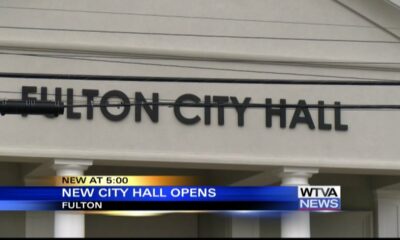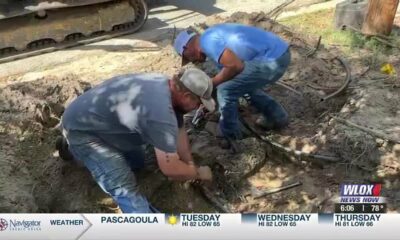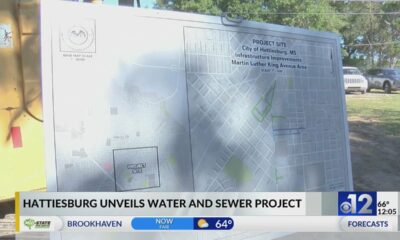Mississippi News
Water, sewage: $1B in upgrades to be spent
Cities and counties will soon spend $1 billion in water, sewer upgrades as inflation rises
After years of struggling with home wells running dry, Amanda Barkley and her neighbors near the Falkner community on the Benton-Tippah county line hope soon to have ample, clean water as Mississippi prepares to spend over $1 billion in federal money on water and sewerage statewide.
“We got a letter from (Public Service Commissioner) Brandon Presley,” Barkley said. “Three Forks Water Association is applying for the grant to hook us up … It sounds like the money is there, the water association is going to do it. We’re just very hopeful.”
The Mississippi Legislature earlier this year decided to spend up to $750 million of the $1.8 billion it received in American Rescue Plan Act federal pandemic relief money on two of the state’s major problems: In many urban areas, most notably Jackson, antiquated water and sewerage systems are collapsing. In rural areas, such as where Barkley lives, 13% of the state’s population does not have public water service.
The issue is a hindrance to the state’s growth and economic development, and it’s a major health concern. Drinking water contamination in rural wells and from crumbling urban systems is widespread, as is pollution from leaking sewer mains and rural septic tanks.
FOLLOW THE MONEY: Full coverage of how Mississippi is spending billions in federal pandemic relief tax dollars
The Legislature earmarked $450 million to provide matching grants to cities and counties for water, sewerage and stormwater drainage projects. Cities and counties received about $900 million directly from ARPA that they can use for the matching grant program. For approved projects, the state will match counties’ and most cities’ ARPA money 1-to-1, but will provide a 2-to-1 match on projects for towns that received less than $1 million from ARPA.
The Legislature also set aside $300 million for grants of up to $2.5 million each for rural water associations, from which most Mississippians receive their water. This is for projects such as the one Barkley and her neighbors hope will provide them water.
The Mississippi Department of Environmental Quality and Mississippi Department of Health are running the city/county and rural water grant programs, respectively. They have in recent weeks promulgated rules and scoring and are taking applications, and plan to start awarding grants by the fall.
‘We invented the wheel on this’
Lt. Gov. Delbert Hosemann led the push in the Legislature and lobbied local governments to focus ARPA spending on infrastructure projects that would be “transformational and generational.” Last year, he traveled the state urging local governments to hold onto the ARPA funds they had already received until the Legislature could work out a plan to match their money.
“I’ve been very pleased with the cities that have held their money for the matching grants,” Hosemann said. “… It appears most of them did, and I’m hopeful they saved at least between $300 million and $400 million that can be fully matched to give us a big infusion on water and sewer statewide.”
The money won’t be a cure-all for Mississippi’s water and sewer infrastructure. Needs in many areas, such as Jackson, are far beyond the money available. But it’s well beyond what Mississippi’s cities, counties and hamlets could do on their own, and is being called a once-in-a-lifetime opportunity by many leaders.
“We just appreciate this lift, this push,” said Greenville Mayor Errick Simmons, who said his city hopes to have the state program match his city’s $6.2 million in direct ARPA funds to cover $12.4 million in water and wastewater system improvements. “… Our children and their children will see the positive benefits of infrastructure work.”
READ MORE: Should safe drinking water be a priority for Mississippi’s federal stimulus spending?
Greenwood Mayor Carolyn McAdams, president of the Mississippi Municipal League, said cities are reading the new regulations and signing up for webinars with MDEQ and that MML and the secretary of state’s office are helping cities navigate the grant programs. She said Greenwood has $3.2 million it hopes to get matched to “re-line a lot of sewer pipes that are 70 to 75 years old,” and other work.
“We’re sitting on go — or at least on one or two of ‘one-two-three, ready go,'” McAdams said. “… We’re really appreciative of the additional funding from the state level. I really totally agreed with Lt. Gov. Hosemann. A lot of people could have taken that money and done other things that, while needed, might not be the best decision. When you narrow it down to water and wastewater, you’re doing things that are going to last many years.”
Robert Lee, interim city engineer for Jackson, said the city is finalizing plans for projects. The city plans to use $25 million of the $42 million it received from ARPA for the state water and sewer match program — the largest amount of any city in the state.
Lee said the city plans to focus these projects on sewerage, not because the city doesn’t have plenty of drinking water system needs, but because many of the water projects have much larger price tags and will have to be staged over years.
“On the sewer side, we have a (court) consent decree (to fix problems),” Lee said. “Right now, I’m looking at sewer overflowing and spilling as we talk.”
Derrick Surrette, director of the Mississippi Association of Supervisors, said most counties in Mississippi do not have water or sewerage operations, but some plan to apply for matching grants from the state for stormwater projects. He said these are mostly larger, more developed counties with major drainage issues. He said many other counties will be using their ARPA funds on road and bridge work and other issues, without getting a match from the state.
Surrette said some counties are looking to partner with rural water associations, and use county ARPA funds to help them leverage a state match and upgrade water systems and service. But he said there is still some confusion and concern about counties giving money to non-county entities.
“The rural water issue gets more complicated,” Surrette said. “Once the money goes off the county books to a private association, that’s where all sorts of red flags go up for counties. It’s not that we don’t want to do it, it’s just being very cautious. You can’t just give that money to a rural water association and hope they get it done.
“But this was a first for everybody, and the legislators had to invent the wheel on this, and we appreciate the work they’ve done,” Surrette said. “We invented the wheel on this, so there will probably need to be some more tweaking.”
Kirby Mayfield, CEO of the Mississippi Rural Water Association, said he believes many water associations will take advantage of the state’s $300 million grant program, although the money is not enough to cover all the needs of more than 900 associations. Most of the systems were created in the 1960s and ’70s when affordable USDA grants and loans were available and they have not been able to afford needed upgrades and replacements.
“I think we will never see a chance like this again,” Mayfield said. “This is really huge for our water industry.”
Mayfield said the grants will allow for repairs and expansion, and probably help some very small associations merge and consolidate.
Deadlines loom, inflation eats into projects
Mississippi is behind most other states in standing up programs and spending federal ARPA money. States have a deadline of December 2024 to allocate the money, and December 2026 to finish spending it. While those deadlines appear generous, Mississippi will see a flood of projects statewide, with a finite number of water, sewerage and drainage contractors available. Some local governments may be sweating deadlines on the larger projects.
Also, as the clock has ticked, inflation has risen to record levels and construction is particularly hit hard.
“We’re looking at construction costs up 40% from our original estimates from before the (legislative) session,” said George Flaggs, mayor of Vicksburg. “Asphalt has gone up 52% since the pandemic, and anything with iron in it has gone up more than that. We’ve had to re-bid two city projects. Plus, an issue now is the workforce — all the contractors are in need of workers. I think we can still make all the deadlines, but may have to cut back on some of the projects we do.”
READ MORE: Mississippi procrastinates as other states plan for, spend billions in pandemic stimulus
McAdams and Simmons said they’ve seen the same skyrocketing inflation in construction costs.
“Pre-COVID, for 8-inch concrete pavement, it cost $72.22 per square yard,” Simmons said. “In May, it was running $119 for that same square yard.”
McAdams said Greenwood got estimates on projects when ARPA payments first went out, but those estimates are no longer near reality. She said with local governments across Mississippi — and neighboring states, too — doing projects at the same time, contractors and labor are liable to be in short supply.
Hosemann said inflation is one reason the Legislature held back on spending about $400 million in state ARPA funds early this year.
“First of all, we believed there was going to be high inflation and possibly a recession,” Hosemann said. “Second of all, we weren’t sure Mississippi would have the contractors to consume over $2 billion all at once — and then you also feed inflation itself when you do that … We’re looking longer out how these funds can help infuse the economy, not just in one year.”
Lee said that for water, sewerage and drainage projects there are also huge design, engineering and other professional service costs that come into play. He noted the state’s matching grant program caps what it will cover for those costs at 4% of a project’s total cost. But for water and sewerage and drainage projects, those costs can easily run 8% to 10%.
While the state matching program will cover only 4%, the federal ARPA regulations for money that went directly to local governments doesn’t have that cap. Lee said this could likely mean that for some projects, local governments will have to hold back some of their federal dollars that otherwise could have gotten a 1-to-1 or 2-to-1 match from the state.
“That just means we may not be able to get the full match,” Lee said. “Is it a deal killer? No, of course we can work with that, but I would think for smaller towns that could be an issue.”
Surrette said some county leaders have raised this issue, noting that for large projects, just hiring a consultant to make sure ARPA regs are being followed could run more than 4%. But he said in many cases, local governments have already done engineering and other work in drafting projects. And, he said, a 1-to-1 match on the projects makes such costs a small price to pay.
“A 100-percent grant is almost unheard of,” Surrette said. “We’re more used to 80-percent grants … There’s times to argue and fuss and complain, but maybe not when you’re doubling your money. Plus, (federal) Treasury gave them a lot of flexibility (on direct dollars). I think it’s going to be doable.”
First, ‘catch a rabbit‘
Surrette said perhaps a larger concern — especially for smaller local governments that don’t have large clerical staffs or consultants they regularly use — is making sure all T’s are crossed and I’s dotted on federal spending and project regulations.
Not doing so with federal money, Surrette said, could result in “clawbacks” — the feds wanting the money repaid.
Surrette said that for now, state lawmakers left that work up to the local governments, but he hopes the state might reconsider and perhaps hire staff or consultants that could help local governments. He said some cities and counties might be willing to pay a fee for such help.
Hosemann said such issues could still be addressed by lawmakers, and tweaks made if needed.
“Certainly if that’s an issue they want to bring to the Legislature, we will look at it,” Hosemann said. “Our goal for this money is for it to go into the ground, have an economic impact. We want it done correctly, but we wanted to get moving. The first thing you have to have for a recipe for rabbit stew is to catch a rabbit.”
Simmons said Greenville, like many other cities, has struggled to maintain and upgrade infrastructure and will continue after the ARPA money is used. But he said the program “is a good start for cities and towns to become more competitive,” and he thanked Congress and state’s legislative leaders. All Republican members of Congress voted against the $1.9 trillion ARPA measure.
“We want to thank Lt. Gov. Delbert Hosemann and Speaker Philip Gunn for keeping their word to towns and cities,” Simmons said. “… When you strengthen Mississippi’s cities and communities, you strengthen Mississippi. That’s how we grow and thrive as a state.”
This article first appeared on Mississippi Today and is republished here under a Creative Commons license.
Mississippi News
Events happening this weekend in Mississippi: April 25-27
SUMMARY: This weekend in Mississippi (April 25-27) features a variety of events across Central and Pine Belt regions. Highlights include MiraGotSoul at Vibe Studio in Jackson, a community Dinner and Movie in Clinton, and the Natchez Kite Festival. Enjoy live performances with Sweet Lizzy Project in Natchez and the New Bourbon Street Jazz Band in Clinton. Family-friendly activities include the Native Plant Fest and Community Farmers Market in Jackson. In Hattiesburg, catch the Henry Cho tour and the Downtown Crawfish Jam Music Festival. Overall, it’s a weekend full of entertainment, culture, and fun activities for all ages.
The post Events happening this weekend in Mississippi: April 25-27 appeared first on www.wjtv.com
Mississippi News
Events happening this weekend in Mississippi: April 18-20
SUMMARY: This weekend (April 18-20), Mississippi offers a variety of events for all ages. In Jackson, enjoy Food Truck Friday, a jazz concert, free outdoor movie screenings, and multiple exhibitions including “Of Salt and Spirit” and “Hurricane Katrina: Mississippi Remembers.” For family fun, there’s an Easter Egg Hunt at the Ag Museum and “Bunnies & Butterflies” at MCM. Natchez features the Spring Pilgrimage, Lafayette’s 200th anniversary celebration, and a farmers market. In the Pine Belt, highlights include Live at Five, a Spring Candle-Making Workshop, and Easter events at the Hattiesburg Zoo. Don’t miss the Bluff City Block Party and more!
The post Events happening this weekend in Mississippi: April 18-20 appeared first on www.wjtv.com
Mississippi News
Events happening this weekend in Mississippi: April 11-13
SUMMARY: This weekend in Mississippi (April 11-13), enjoy a variety of events across the state. Highlights include the Eudora Welty Birthday Bash in Jackson, Trivia Night at the Mississippi Museum of Natural Science, and Boots & Bling Fundraiser in Natchez. For family fun, check out the Bunny Bonanza in Jackson or the Easter Egg Hunt in Clinton. The Natchez Concours d’Elegance Car Show and Stranger Than Fiction Film Festival offer cultural experiences, while the 12th Annual Dragon Boat Regatta in Ridgeland and the Hub City Classic Car Show in Hattiesburg provide exciting activities for all ages.
The post Events happening this weekend in Mississippi: April 11-13 appeared first on www.wjtv.com
-

 News from the South - Missouri News Feed2 days ago
News from the South - Missouri News Feed2 days agoMissouri lawmakers on the cusp of legalizing housing discrimination
-

 SuperTalk FM6 days ago
SuperTalk FM6 days agoNew Amazon dock operations facility to bring 1,000 jobs to Marshall County
-

 News from the South - Alabama News Feed6 days ago
News from the South - Alabama News Feed6 days agoPrayer Vigil Held for Ronald Dumas Jr., Family Continues to Pray for His Return | April 21, 2025 | N
-

 News from the South - Florida News Feed6 days ago
News from the South - Florida News Feed6 days agoTrump touts manufacturing while undercutting state efforts to help factories
-

 Mississippi Today7 days ago
Mississippi Today7 days ago‘Trainwreck on the horizon’: The costly pains of Mississippi’s small water and sewer systems
-

 News from the South - Texas News Feed7 days ago
News from the South - Texas News Feed7 days agoMeteorologist Chita Craft is tracking a Severe Thunderstorm Warning that's in effect now
-

 News from the South - Florida News Feed6 days ago
News from the South - Florida News Feed6 days agoFederal report due on Lumbee Tribe of North Carolina’s path to recognition as a tribal nation
-

 News from the South - Virginia News Feed7 days ago
News from the South - Virginia News Feed7 days agoTaking video of military bases using drones could be outlawed | Virginia
















































